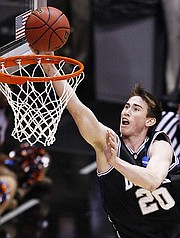When people think of public education, they may not see it as a multi-million or multi-billion dollar business.
But last year, Missouri spent $11.8 billion educating nearly 850,000 students. Jefferson City Public Schools spent $93.6 million educating 8,335 students. And it's certainly not getting less expensive.
The Jefferson City school district is spending about $30 million more than it did 15 years ago. Of course, its revenue was also significantly less at $56.4 million, compared to $93.7 million in 2015.
A $30 million increase sounds like a lot, but the district's composition has also changed quite a bit over the last 15 years, said Chief Financial Officer Jason Hoffman.
"A reason we may spend more than other districts is because of our free-and-reduced-lunch kids," he said. "We build in a lot of different supports for them."
Since 2001, the district's number of students on free and reduced lunch went from about 29 percent to 55.2 percent. Schools get an added amount for their free-and-reduced-lunch students because those students come from poverty and generally cost more to educate, Hoffman said.
The district added full-day kindergarten, which means more kindergarten teachers. It also added 600 more students since the 2001-02 school year.
In the same time frame, JCPS has upped its annual per-pupil spending by an average of 3 percent per year.
Some of the district's operating costs have also more than doubled, including health insurance, food costs and utilities, Hoffman said. Teacher salaries have increased as well and are now third in the central region for beginning bachelor degree pay and master's degree pay, according to data from the Missouri State Teachers Association.
Ninety-three million dollars sounds like a staggering amount. Hoffman said he gets a lot of questions about why the district needs more money. Why does an education cost so much?
Hoffman pointed to a slide show he made a couple years ago labeled "Popular Belief" printed above a tree overflowing with dollar bills.
"I think people think we have all this money and we spend it frivolously," Hoffman said. "But our community's expectation is for us to be better than average. I think they'd expect us to be a lot better than average, but we're in the bottom third of our state for spending per pupil."
The district spent $9,254.39 per student in 2015, while the state average was $10,313.72, according to data from the Department of Elementary and Secondary Education. If JCPS caught up to that, it would have $8.8 million more in its budget.
So what does the district's money go toward?
As Hoffman likes to say, schools are in the people business, so naturally the majority of its money goes to staff.
In the 2014-15 school year, JCPS spent 78.5 percent of its $93.6 million on staff salaries and benefits, which is only a couple decimals higher than the state average.
"Our most valuable resource is going to be a great teacher in the classroom," Hoffman said. "That's been the thought since I've been here and since before I started. Any new revenue that we get, that's one of the first things we make sure we'll able to pay for."
JCPS has about 1,200 employees with about 50-100 in turnover each year. Hoffman said the district has to compensate for salary increases each year, but the turnover rate helps balance the added salary expenses.
The rest of the money goes toward supplies and utilities at 12.7 percent and for purchased services at 8.9 percent.
Supplies include anything that costs the district less than $1,000 per unit. The school uses supply money to buy iPads, computers, textbooks, and teacher and custodial supplies, etc. Two of the biggest supply costs are technology and food purchased for school breakfasts and lunches. Of the $10 million the district spends for supplies, food cost eats up $2.5 million, Hoffman said.
Purchased services include substitute teachers and school bus transportation, the biggest expenses out of that budget. It also goes toward partnerships the district has, such as the one with ICLE (International Center for Leadership in Education), the phone bill, Internet connection, professional development and half of the salaries school resource officers receive.
To break it down on a different level, here's what it costs to operate:
• Southwest Early Childhood Center: $1.8 million
• 11 elementary schools: $29 million total at an average of $2.64 million each
• Thomas Jefferson and Lewis and Clark middle schools: $12 million total at an average of $6.8 million each
• Jefferson City High School and Simonsen 9th Grade Center: $18.3 million
• Nichols Career Center: $2.9 million
These amounts don't include central office staff, maintenance, transportation, technology, property insurance and legal insurance, Hoffman said.
So where does all this money come from?
Every district's revenue resources vary. JCPS relies mostly on local taxpayers. Last year, $43 million came from local property tax, which was 47.2 percent of its revenue. In total, 66.95 percent of its money comes from local dollars.
The rest of it flows in from the state government at 22.5 percent and the federal government at 10.3 percent.
The last 0.25 percent of the budget is in an ambiguous "other" category, which comes mostly from tuition that schools pay so their students can attend Nichols Career Center.
Those percentages have remained fairly consistent over the past 15 years.
In 2000-01, property tax contributions were a little lower at 42.4 percent, but other local tax contributions increased. The district received 11.6 percent from Prop C (sales tax) and other local and county taxes at 15.2 percent.
It was getting 7.3 percent from the federal government and 23.2 percent from the state.
Working with a budget that fluctuates each year can be difficult, especially since Missouri's foundation formula is grossly underfunded, falling short by $463 million.
Last year, the district's state funding included $18 million from the foundation formula. If it was fully funded, Hoffman said, they'd have $5 million more to work with.
"With an underfunded formula like we have, it's so hard to predict what we'll get from one year to the next because we're just at the whim of whatever they (state legislators) think they can come up with," Hoffman said. "If we had a formula that was fully funded, we could project out what we'd get. There are so many moving parts; the state aid is the only piece we can't predict. There's no goal for them; it's just whatever they feel like adding."
On the bright side, Hoffman said, property taxes have been fairly consistent through the years, and the district hopes to get steady increases.
"We feel really fortunate because our local revenue hasn't fluctuated as much as some areas have," he said. "When housing prices were going up, skyrocketing up, ours went up but not nearly as much as it did in the metro areas like St. Louis and Kansas City, but even more in the Vegas area, Phoenix and Florida area. So when the housing market came back down, they saw huge dips and even went negative. Ours went up just a little during the good times and down just a little bit and has been kind of been flat."
Hoffman said the only other improvement to JCPS's funding would be if Missouri collected online sales tax, which would bring in a lot more money for the district.
Related story: JCPS superintendent says passing a bond not a priority



